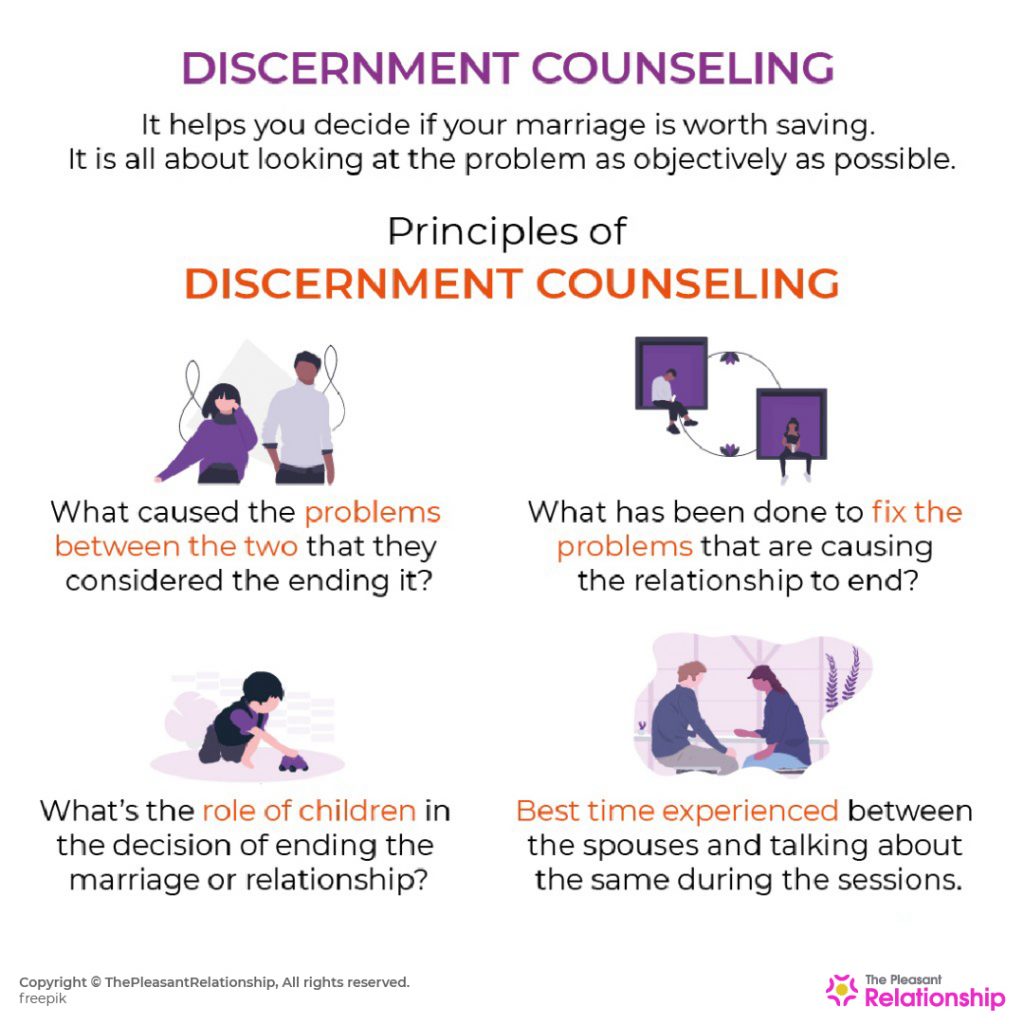
There is marriage counseling, which helps the couples on the brink to work together to save their partnership. Then, there is discernment counseling which helps you decide if your marriage is worth saving.
Your discernment counselor doesn’t try to help you save the relationship. Your counselor determines if there is anything left to save in your marriage. It is focused on getting to a result.
Being in a bad relationship can be mentally and emotionally draining. It is worse when you don’t know if you should give it another try or simply, let it go. This is where discernment counseling comes into the picture.
This type of counseling is more suited for married couples. However, if you are on the verge of break-up, you can still get help from this counseling. It is quite therapeutic in nature as well.
There is so much to know about this non-traditional yet effective form of couple counseling. Let’s start with understanding the concept of discernment counseling.
Discernment Counseling Infographic

What is Discernment Counseling?
SUMMARY
Discernment counseling is all about looking at the problem as objectively as possible. Unlike marriage and family therapists, a discernment counselor doesn’t try to fix anything. He or she places zero value judgment on both partners. They are then guided through their problems. Unlike other therapies, the couple walks out from this one with a well-informed decision. There is no room left for contemplation after this.
As per Kristin Sliwicki, a licensed marriage and family therapist, “Discernment counseling is a structured assessment process, not treatment.
It is designed to provide a couple with the information they need to evaluate their relationship and take action – either to pursue a divorce or to commit to a 6-month course of intensive marital therapy.”
Discernment counseling is an exclusive therapy designed for couples struggling with an intense decision. The decision is whether or not to stay in a bad marriage or relationship?
The couple’s therapist helps them put a finger on their marital (or relationship) problems. These are the problems that make them contemplate divorce or a break-up.
Basically, it is the type of counseling that assists couples in determining whether they should file for a divorce or go for reconciliation. It is useful for people who are considering a divorce—the keyword here is ‘considering.’
The couples who have decided to go for divorce aren’t advised to go for this therapy.
The reason is that they already know the reasons why their relationship won’t work any longer. They have already decided on the outcome of their marriage.
WARNING
Discernment counseling is also known as pre-divorce counseling. This counseling is for mixed agenda couples –those who have lingering thoughts about their marriage or relationship.
How Does Discernment Counseling Work?
Bill Doherty, the co-founder of the Doherty Relationship Institute, says, “It’s about gaining more clarity and confidence around the relationship’s direction. It’s about understanding how the relationship got to this point.”
Bill is also the brains behind discernment counseling. This type of counseling was developed by him as a part of his work at the University of Minnesota. He came up with this counseling to help the ‘mixed-agenda’ couples.
Under this situation, one of the two partners is willing to work on the marriage. The other however doubts the authenticity of the marriage.
There are few tactics and theories developed by Doherty to help both the spouses. It helps them to understand the exact pros and cons of their marriage or relationship.
The couple makes a decision after addressing these problems. Let’s learn about the process of this counseling.
What Happens in Discernment Counseling?
SUMMARY
After the initial counseling session, the counselor will dive deep into the marriage and try to find what the problem is.
The initial counseling session comprises of approximately two hours. During this time, the therapist meets the couple and understands their marital problems.
The leaning-in partner is given emotional support if he or she demands. The other partner is counseled to feel the emotions (which perhaps he or she is afraid to feel) related to the marriage.
Once that’s done, the discernment counselor dives deeper into the marriage. The couple in question brings clarity to the problems they are facing with each other.
They also try to understand the problems surrounding their relationship. Thereafter, the couple starts getting confident in the direction of their marriage.
What is the First Session of Discernment Counseling Like?
SUMMARY
The counseling session can have 4 outcomes – the couple stays married, they move towards the divorce process, they get marriage counseling for the next 6 months, or end up postponing the decision.
The first session helps each spouse to put a finger on his and her problem. They start digging more into it. During the process, they are asked if they should continue with the relationship or marriage. This is however done without any self-judgments.
The purpose of the first session is to bring clarity and confidence to the marriage or relationship. Once the first session is done, each spouse decides the future separately. They also decide if they want to continue with more sessions.
The next session is booked if the couples decide to do so. The maximum sessions provided by the therapist are usually five. These sessions can be extended based on the needs and choices of the couple.
Outcomes of Discernment Counseling
There are three possible outcomes of the counseling session –
- Stay married
- Move towards divorce process
- Gets marriage counseling for the next 6 months. The time limit is to see if their relationship improves or gets somewhere. During this time, they agree to try their best to keep divorce off the table
- Postponing the decision. This counseling accepts ambivalence rather than convincing the couple to work it out and get over it.
NOTE
Generally, it’s the first session that asks both the spouses to be present at one time. The rest of the sessions are done individually. The next sessions are scheduled for both spouses who are in for therapy. This protocol helps each spouse to learn about their contribution to marital problems. Even if they go for a divorce, it is not seen as a failure in this counseling. It is, in fact, a positive outcome, since the purpose of this counseling is to reach a well-informed decision.
Principles of Discernment Counseling
Discernment counseling isn’t a treatment for couples whose relationship is on the brink. It is a concept, which aims to help people suffering from bad relationships.
It helps people in finding clarity and confidence to get through the whole situation.
Discernment counseling is based on four core principles –
- What caused the problems between the two that they considered the ending it?
- What has been done to fix the problems that are causing the relationship to end?
- What’s the role of children in the decision of ending the marriage or relationship?
- The best time experienced between the spouses and talking about the same during the sessions.
The counseling is considered successful when both partners have dived deep into the above principles. They reach a solution when they finally understand the problems in their marriage.
They also get clarity on how to move forward with the relationship or file a divorce.
How to interact with the couples during discernment counseling?
One should craft the questions carefully for every couple that needs discernment counseling. So how can one interact with the spouses during the counseling sessions? Here’s one instance-
“Are you willing to work on changing your contributions to the marriage?”
If both spouses agree to it then, suggest them to move forward and work on their marriage. Set a time limit of six months.
Make them commit to working intensely on their marriage. After the given time period, ask them the same about their future relationship. By this time, they will have more clarity than before.
If the answer to even one of them is no, then perhaps find the reason behind why they feel so? The conflict between the spouses can put the counselor in a difficult place.
How to engage with both spouses becomes quite a revealing question. Thus, the next string of questions should be designed with a lot of thought and consideration.
How to converse with the leaning-in spouse?
Generally, the leaning-in spouse in a lot of emotional turmoil. They are afraid and in pain because of the possible divorce or separation from their partner.
So, it is advisable to start with some general questions, such as, “How are you doing?”
Once they get comfortable, start connecting with them on an emotional level. Tell them how the situation is with the other spouse. You can ask them to bring certain changes in themselves to save their marriage.
WARNING
Since the leaning-in spouse is more emotional than the leaning-out spouse; it might get difficult to tackle him or her. Usually, these spouses are frustrated, disappointed and angry. They might just channel it towards you during the session. So, be prepared to deal with it. Also, understand that they need a lot of understanding on your part.
How to talk to the leaning-out spouse?
The leaning-out spouse is the one who is more interested in dissolving the marriage or relationship.
This spouse doesn’t see any reason to keep the marriage going. While the leaning-out spouse does not have that bad emotional state, they still have their issues to deal with.
You might have to grill them to get their problems out of them. Since they are almost on the verge of ending their marriage, they might resist feeling any emotion.
However, their state of mind is usually better than the leaning-in spouse. This means that they are comparatively calm in their heads. Nonetheless, you can never tell with them either. They may lose it during the grilling questions.
Take-home Message
Even if you are thinking that there might be potential problems for your current relationship or marriage, it is advisable to book a discernment counselor.
Who wants to visit a divorce professional over a counselor that helps them reach a confirmed decision?
Well, prevention is always better than cure. The best thing about discernment counseling is that no one will judge you for your decision.
You can either decide to go forward with your marriage or file for a divorce. Both ways, it’s a success.
Surabhi wakes up every day with a drive to craft words that can create a soulful impact. Creatively adventurous, she is always seeking to learn new skills and acquire new experiences. With a hidden soft corner for languages (especially Urdu), she writes poetry occasionally, binges on romantic shows, and LOVES to talk. A hustler, admirer, chaser, Surabhi is just another-someone who refused to give up on her dreams. She says, she is just somebody who’s trying to make herself a writer and for now, she’s just writing...